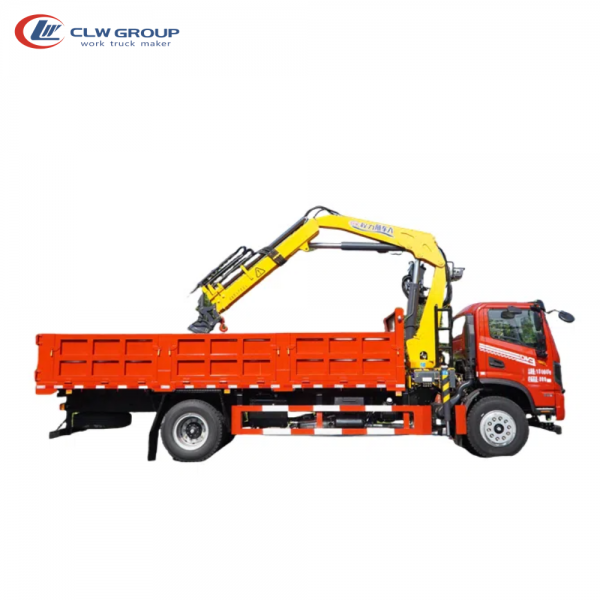rescue truck -mounted cranes play a crucial role in various industries, including construction, transportation, and logistics. These versatile machines are used for lifting and moving heavy loads, making them indispensable in many work environments. However, the fuel consumption of truck-mounted cranes can be a significant operational cost for businesses, as well as a concern for environmental sustainability. In this article, we will explore the importance of fuel efficiency in truck-mounted cranes and discuss strategies and technologies that can help maximize efficiency and reduce fuel consumption.
Importance of Fuel Efficiency in Truck-Mounted Cranes
Fuel efficiency is a critical consideration for any fleet manager or crane operator. The cost of fuel can account for a significant portion of the overall operating expenses of a truck-mounted crane. By improving fuel efficiency, companies can reduce their fuel costs and increase profitability. Additionally, reducing fuel consumption has a positive impact on the environment by lowering greenhouse gas emissions and helping to mitigate climate change.
There are several factors that can affect the fuel efficiency of a truck-mounted crane, including the design of the crane, the weight of the load being lifted, driving habits, maintenance practices, and operational conditions. By optimizing these factors, operators can improve the fuel efficiency of their cranes and achieve cost savings while also reducing their environmental footprint.
Strategies for Maximizing Fuel Efficiency
1. Proper Maintenance:
Regular maintenance is essential for ensuring the optimal performance and fuel efficiency of a truck-mounted crane. Routine maintenance tasks, such as checking and replacing air filters, inspecting tires for proper inflation, and tuning the engine, can all help improve fuel efficiency. By keeping the crane in good working condition, operators can reduce fuel consumption and extend the lifespan of the machine.
2. Efficient Load Management:
Proper load management is crucial for maximizing fuel efficiency in a truck-mounted crane. Overloading the crane can increase fuel consumption and put unnecessary strain on the engine. Operators should carefully calculate the weight of the load being lifted and ensure that it falls within the crane's specified capacity. By avoiding overloading, operators can reduce fuel consumption and improve overall efficiency.
3. Eco-Driving Techniques:
Adopting eco-driving techniques can also help improve fuel efficiency in truck-mounted cranes. Techniques such as smooth acceleration and deceleration, maintaining a steady speed, and avoiding excessive idling can all contribute to lower fuel consumption. By training operators in eco-driving practices, companies can achieve significant fuel savings and reduce their environmental impact.

4. Utilizing Telematics Technology:
Telematics technology can provide valuable data on the performance and fuel efficiency of a truck-mounted crane. By using telematics systems to monitor fuel consumption, engine performance, and driving behavior, operators can identify areas for improvement and implement strategies to increase efficiency. Telematics technology can also help track maintenance schedules and ensure that the crane is operating at peak performance.
5. Aerodynamic Design:
The design of the truck-mounted crane can also impact fuel efficiency. Aerodynamic features, such as streamlined body shapes and fairings, can help reduce wind resistance and improve fuel economy. By investing in cranes with aerodynamic design elements, operators can achieve better fuel efficiency and lower operating costs.
6. Hybrid and Electric Options:
In recent years, hybrid and electric truck-mounted cranes have become increasingly popular as a way to reduce fuel consumption and lower emissions. Hybrid cranes combine traditional internal combustion engines with electric motors to improve fuel efficiency, while electric cranes run entirely on electric power, eliminating the need for fossil fuels. By incorporating hybrid and electric options into their fleets, companies can significantly reduce their carbon footprint and operating costs.
7. Fuel Management Systems:
Fuel management systems can help operators track fuel usage, identify inefficiencies, and implement strategies to improve fuel efficiency. These systems monitor fuel levels, track fuel consumption in real-time, and provide data analytics to optimize fuel usage. By using fuel management systems, operators can make informed decisions to reduce fuel consumption and lower operating costs.
Conclusion
Maximizing fuel efficiency in truck-mounted cranes is essential for reducing operating costs, improving sustainability, and increasing profitability. By implementing strategies such as proper maintenance, efficient load management, eco-driving techniques, telematics technology, aerodynamic design, hybrid and electric options, and fuel management systems, operators can achieve significant fuel savings and reduce their environmental impact. Investing in fuel-efficient technologies and practices not only benefits the bottom line but also demonstrates a commitment to sustainable operations. By prioritizing fuel efficiency, companies can enhance their competitiveness, meet regulatory requirements, and contribute to a greener future.
